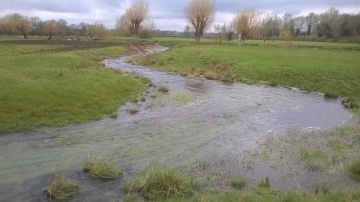Case study:Stony Stratford Sluices Bypass Channel: Difference between revisions
Robclapham (talk | contribs) No edit summary |
Robclapham (talk | contribs) No edit summary |
||
| Line 42: | Line 42: | ||
{{Toggle content start}} | {{Toggle content start}} | ||
{{Case study subcatchment}} | {{Case study subcatchment}} | ||
{{Site}} | {{Site | ||
|Name=Stony Stratford | |||
|WFD water body code=GB105033037920, | |||
|WFD water body name=Ouse (Buckingham to Cosgrove) | |||
|Pre-project morphology=Well defined paleo channel. sinuous. Uniform bed roughness. | |||
|Desired post project morphology=Sinuous with variable bed features | |||
|Heavily modified water body=Yes | |||
|Protected species present=No | |||
|Invasive species present=Yes | |||
|Dominant substrate=Clay | |||
|River corridor land use=Improved/semi-improved grassland/pasture, | |||
|Average bankfull channel width category=2 - 5 m | |||
|Average bankfull channel depth category=0.5 - 2 m | |||
|Mean discharge category=0.1 - 1.0 m³/s | |||
|Average channel gradient category=more than 0.1 | |||
}} | |||
{{Project background}} | {{Project background}} | ||
{{Motivations}} | {{Motivations}} | ||
Revision as of 14:19, 20 April 2016
This case study is pending approval by a RiverWiki administrator.
Project overview
| Status | Complete |
|---|---|
| Project web site | |
| Themes | Fisheries, Habitat and biodiversity, Hydromorphology |
| Country | England |
| Main contact forename | Rob |
| Main contact surname | Clapham |
| Main contact user ID | User:Robclapham |
| Contact organisation | Environment Agency |
| Contact organisation web site | |
| Partner organisations | Milton Keynes Park's Trust |
| Parent multi-site project | |
| This is a parent project encompassing the following projects |
No |
Project summary
The Great Ouse between Milton Keynes and Buckingham is a section of river that has historically suffered deterioration in, part due to the number of man-made structures on the watercourse. Following floods, these large structures prevent re-colonization of displaced fish and impound the river, reducing flows and sediment movement, with impacts on habitat quality and diversity.
To mitigate these pressures, a partnership project was formed by the Environment Agency and Milton Keynes Parks Trust. The works installed a fish friendly flow control structure at the upstream end of a previously disconnected paleo-channel allowing water to flow through it and around Stony Stratford Sluices which are currently impassable to fish.
Monitoring surveys and results
Electric Fishing surveys to be carried out in the first summer following completion.
Lessons learnt
Image gallery
|
Catchment and subcatchment
Site
Project background
Cost for project phases
Reasons for river restoration
Measures
MonitoringHydromorphological quality elements
Biological quality elements
Physico-chemical quality elements
Any other monitoring, e.g. social, economic
Monitoring documents
Additional documents and videos
Additional links and references
Supplementary InformationEdit Supplementary Information
| ||||||||||||||||||||||||||||||||||||||||||||||||||||||||||||||||||||||||||||||||||||||||||||||||||||||||||||||||||||||||||||||||||||||||||||||||||||||||||||||||||||||||||||||||||






